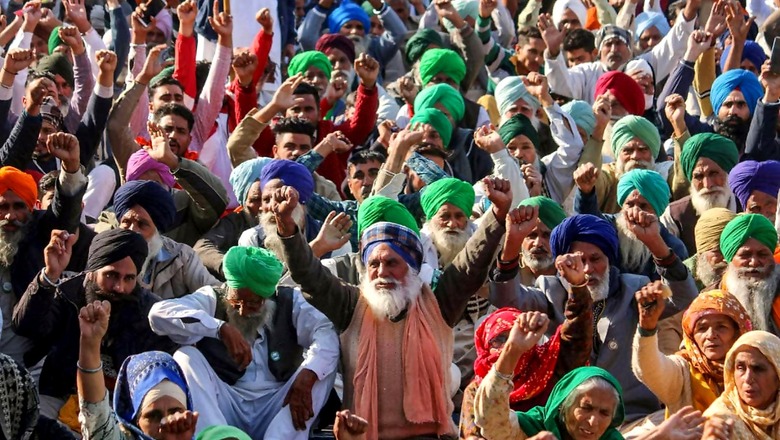
views
Prime Minister Narendra Modi’s surprise visit to Gurudwara Rakabganj in New Delhi to pay tributes to Guru Tegh Bahadur drew flak from some political pundits termed the visit as agenda to send a message to Sikh community and agitating farmers protesting against the centre’s recently passed agriculture laws.
Our democratic setup entitles everyone to protest peacefully and farmers have every right to raise their concern in a peaceful manner. Some of the issues raised by farmers have valid arguments and the government has agreed to listen to them. Even the country’s highest executive office has invited the farmers for discussion and assured them of addressing their grievances. However, the demand for full withdrawal of these legislations is motivated by forces not interested in farmers’ welfare.
Giving a legal guarantee to Minimum Support Price (MSP) has emerged as the protest’s core issue. I agree that there should be a law provision to ensure that private institutions or large corporates should not procure farm produce below MSP declared by the government. However, as far as MSP’s legality is concerned, it is already in the statute under The National Food Security Act, 2013.
Under the Act, MSP is defined under section 2(10) and obligations of Centre/State governments and local authorities for procurement and distribution of food grains. Fear of eradicating the MSP mechanism doesn’t hold any ground because the government must keep procuring food grains to distribute through Public Distribution System (PDS) and achieve other objectives like food security, inflation control, etc. If we keep the economics and legality aside, vote bank politics of our country will never allow any government to abolish the PDS scheme and government will have to procure grains at MSP as long as PDS scheme is run.
Like the MSP, the laws should be amended to include grievance redressal mechanism and farmers should not be left at the whims and fancies of a bureaucrat. The government can simulate Consumer Forum mechanism to address disputes. A separate body for dispute redressal for farmers will ensure speedy resolution and not rely on the already overburdened courts.
There is no doubt about it that the Indian agriculture laws needed reforms. This is evident from the fact that Congress in its 2019 election manifesto, promised abolition of Agricultural Produce Market Committees Act (APMC) in point 11 and Essential Commodities Act, 1955 in point 21 of its poll promise towards agriculture. Similarly, the ruling Aam Aadmi Party (AAP) in Delhi was among the first states to notify the farm laws. Still, its chief minister Arvind Kejriwal is doing theatrics by tearing copies of legislation in the assembly. AAP government notified one of three farm legislations which aims to empower producers to sell their produce anywhere. If the opposition really wants to help farmers, it should come out with suggested amendments and their proposals should be discussed in detail.
However, the turn of events suggests that opposition perceives the protests as an opportunity even if it is at the cost of our national unity, economy, or image. Imaginary fears are stoked into farmers’ minds in the same way it was done during the anti-Citizenship Amendments Act (CAA) protests. None of the opposition leaders has shown courage to explain how these laws will take away farmer’s rights and are shying away from public debate on this topic. If the opposition can steer a nation-wide movement riding on the protestors’ back, they will be blamed for their misjudgement.
I am the son of a farmer and I don’t relate to the agitators as anti-India agenda is being propagated and people are speaking ill about other religions from the stage. I am sure that there are many more like me who have their roots in villages but disassociate themselves from such protests.
If we see the larger issues around agriculture, then MSP is not the solution as it helps only those farmers who have surplus grains to sell. More than ninety per cent of farmers are doing sustenance farming and are producing just enough to meet their own requirements. There is a small section of farmers who are the beneficiaries of the MSP scheme. It is believed that a higher MSP is the panacea for all the woes of the farmer community, then one needs to understand the issue further.
MSP scheme has been in place for decades and cheap farm credit and farm loan waiver, tax-free income, and various subsidies like electricity and fertiliser have been given to farmers. However, due to increasing population, the landholding size has been reduced and has lead farmers to reduce their dependency on crops to live a better life. Government initiatives in the field of animal husbandry, horticulture, fisheries, poultry, etc., should be taken positively and such activities can increase the income of the rural household. Our collective endeavour should be to bring more workforce out of the agriculture sector as they lead to disguised employment, i.e., a type of employment in which more workers are employed than the amount that is actually required.
India is a vast country and there is no one size which fits all. The farmers from Punjab are different from those of states like Bihar, Uttar Pradesh and Andhra Pradesh. Food “Ann” and farmers “Annadata” have a special place in our culture and no one should be allowed to defame our ‘Annadata’ for political agenda. It is on our national interest to resolve this issue in a through proper dialogue.
(Disclaimer: The author is a Chartered Accountant and Public Policy analyst. Views expressed are personal.)
Read all the Latest News, Breaking News and Coronavirus News here




















Comments
0 comment